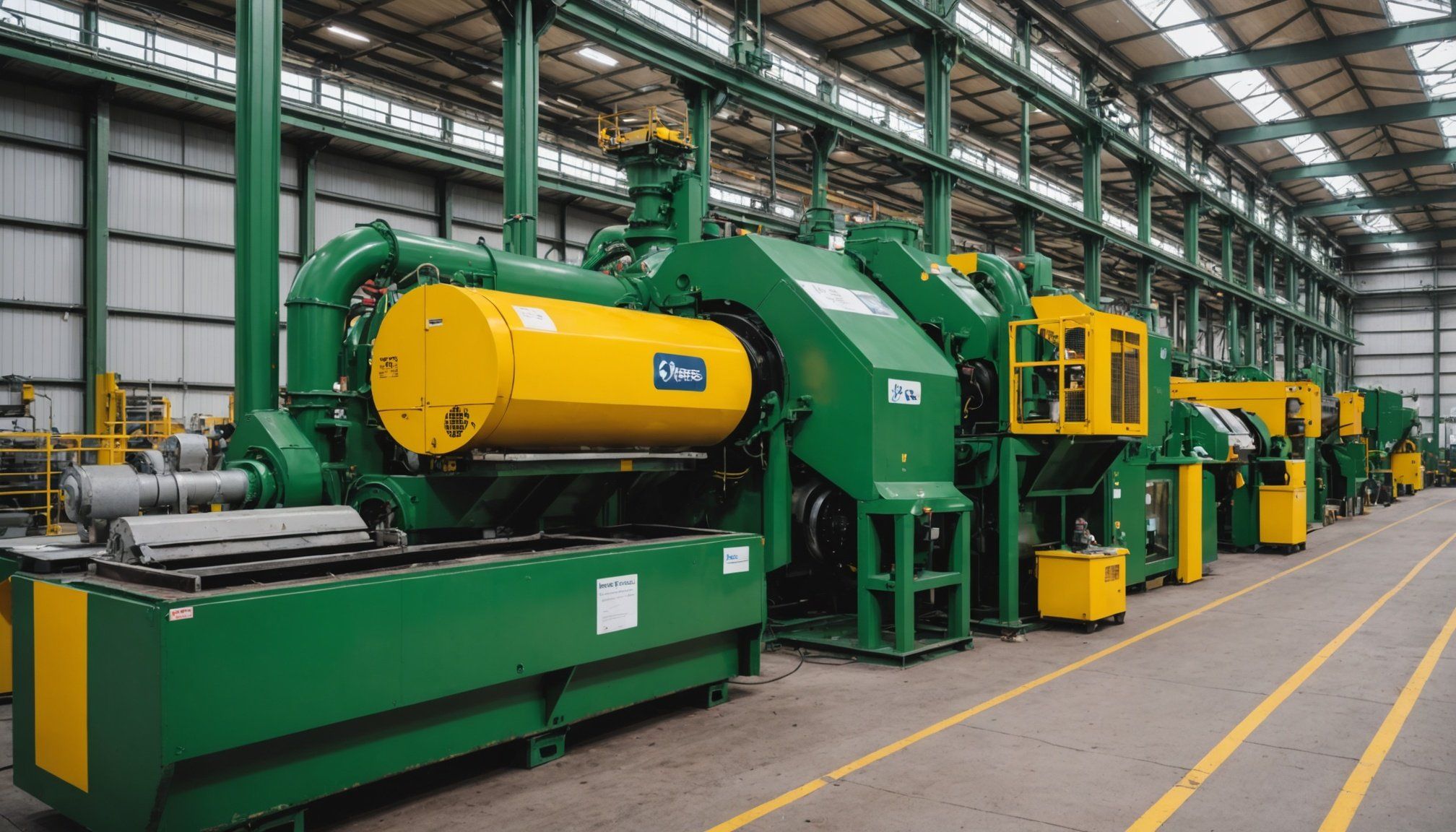Understanding Sustainable Waste Management
Implementing sustainable waste management is crucial in manufacturing environments, aiming to minimize waste and utilize resources efficiently. By understanding sustainable waste management, industries recognize the importance of reducing their environmental footprint through strategic waste handling. This approach not only addresses immediate waste concerns but also fosters a culture of responsibility and innovation.
Core principles of effective waste management strategies include waste reduction strategies, recycling, and reuse. These principles are instrumental in minimizing waste generation and promoting resource efficiency. By identifying and rectifying inefficiencies, manufacturers can streamline processes, save costs, and contribute positively to the environment.
Also to see : Harnessing AI for UK Non-Profits: Boosting Donor Engagement Through Cutting-Edge Technology
The environmental benefits of sustainable practices extend beyond waste reduction. They involve conserving natural resources, reducing pollution, and enhancing brand reputation. Long-term, sustainable waste management contributes to cleaner ecosystems and communities by diverting refuse from landfills, decreasing greenhouse gas emissions, and limiting resource extraction pressures.
Ultimately, businesses that pursue comprehensive sustainable waste management can achieve greater operational efficiency and corporate responsibility. Adopting these practices demonstrates a commitment to environmental stewardship, aligning with global sustainability goals. As industries move towards greener futures, embracing waste management rooted in sustainability is not only beneficial but essential.
Also to read : Harnessing Tech Prowess: Elevating Client Services for Financial Advisors in the UK
Regulatory Framework in the UK
Understanding the UK waste management regulations is essential for manufacturing operations aiming to stay compliant and environmentally responsible. The UK’s legislative landscape features key regulatory requirements outlined in documents such as the Environmental Protection Act 1990 and the Waste Regulations 2011, which dictate strict guidelines for waste handling, disposal, and recycling. Compliance with these guidelines ensures that manufacturers contribute positively towards reducing environmental harm and ultimately adhere to national environmental policies.
Compliance guidelines are pivotal and directly influence waste handling protocols within manufacturing sectors. These regulations necessitate the development of tailored waste management plans that align with the government’s sustainability goals. By keeping up with policy changes, companies can ensure regulatory compliance, maintain operational continuity, and minimise legal risks.
Looking forward, UK waste management legislation anticipates incorporating more stringent environmental measures and reforms focused on increasing recycling rates and reducing landfill dependence. Manufacturers should prepare for future policy shifts that may include enhanced producer responsibility and spurred adoption of circular economy models. Adapting to these evolving requirements will be critical for manufacturers to not only comply with environmental policies but also to thrive as leaders in sustainable operations.
Best Practices for Waste Reduction
In manufacturing, embracing waste reduction techniques is vital for both operational efficiency and environmental responsibility. Identifying waste streams within processes is the first step in this journey. Operations can be scrutinized for inefficiencies, allowing for targeted improvements. By implementing waste reduction techniques, manufacturers significantly enhance their operational efficiency, reducing costs and resource consumption.
One key approach involves practising operational efficiency through lean manufacturing principles. This entails minimizing waste at every production stage, from supply chain to delivery, emphasizing quality and efficiency. Adhering to these principles leads to streamlined operations and optimal resource use.
Another pivotal strategy is adopting the circular economy model. This concept radically shifts the way materials are used, emphasizing recyclability, reuse, and product life extension. By returning materials into the production loop, manufacturers contribute to a sustainable ecosystem that reduces waste generation and reliance on new resources. The circular economy not only minimizes environmental footprints but also fosters innovation in material usage.
For manufacturers, these practices are not just environmental imperatives but also avenues to explore sustainable waste management. Embracing these methods today sets a foundation for improved productivity and sustainability tomorrow, reinforcing a commitment to ethical and responsible production.
Eco-Friendly Materials and Processes
Incorporating eco-friendly materials and green manufacturing practices is essential for the evolution of sustainable industries. Utilizing sustainable materials benefits manufacturers by reducing environmental harm and enhancing product value. Materials like recycled plastics, bamboo, and biodegradable composites offer smarter alternatives to conventional resources. These materials not only diminish ecological footprints but also open innovative pathways for future manufacturing processes.
Integrating green manufacturing practices involves adopting eco-friendly processes that prioritize reduced environmental impact. Techniques such as energy-efficient production, water conservation, and waste minimization contribute to a lesser environmental burden. For instance, using solar energy to power manufacturing plants or closed-loop water systems showcases commitment to sustainability goals.
Manufacturers can implement strategies for sustainable practices by assessing their current processes and identifying areas for improvement. This might include opting for renewable resources, committing to waste reduction techniques, or redesigning products for longevity and recyclability. Progress in these areas ensures alignment with global sustainability initiatives, such as the Paris Agreement, promoting responsible consumption and production.
As more consumers demand environmentally conscious products, embracing eco-friendly materials and processes equips manufacturers to meet these expectations, ultimately achieving not just compliance, but leadership in green innovation.
Tools and Strategies for Implementation
Incorporating robust waste management tools is essential for developing efficient and effective strategies. These tools encompass a variety of technologies and methodologies, including strategic planning software and automated waste sorting systems. By employing the right tools, manufacturers can streamline their waste processes and ensure a more organized approach to managing waste.
Frameworks for executing a waste management plan require careful strategic planning and clear implementation strategies. A successful plan typically involves establishing clear objectives, timelines, and responsibilities. Additionally, integrating tools such as waste auditing software helps track and analyze waste outputs, providing invaluable data for ongoing improvements.
To quantify the effectiveness of these plans, identifying and monitoring key performance indicators (KPIs) is critical. Common KPIs in waste management include waste diversion rates, cost savings from recycling, and overall reduction in waste production. Tracking these metrics assists in measuring the impact of waste management initiatives on environmental and operational outcomes.
Manufacturers should consider adopting these methodologies not only to align with legal compliance but also to contribute positively towards sustainable waste management. Through systematic implementation and vigilant monitoring, industries can significantly reduce their environmental footprint while achieving operational efficiencies.
Case Studies of Successful Implementation
Exploring case studies of UK manufacturing plants illustrates the successful adoption of sustainable practices. These stories showcase how manufacturers have redefined their operations to prioritize waste reduction strategies, catalysing positive environmental and operational outcomes.
-
Furniture Manufacturer Case Study: By integrating a circular economy model, this company repurposed offcuts into new products, reducing waste by 60%. This strategy underlined the benefits of closing the loop in materials usage, demonstrating a clear path to sustainability that other manufacturers can emulate.
-
Food Processing Plant Case Study: Implementing sophisticated waste management tools, such as automated sorting systems, minimized waste by 45%. These systems not only streamlined operations but also facilitated adherence to stringent UK waste management regulations, highlighting the synergy between technology and compliance.
-
Automotive Industry Case Study: Adopting sustainable materials like recycled plastics significantly cut resource consumption. Practicing green manufacturing processes reaffirmed the brand’s commitment to environmental stewardship, serving as a benchmark for peers.
Analyzing these case studies reveals lessons learned: embracing innovative strategies can profoundly impact waste management. By understanding and applying these approaches, other manufacturers can enhance their sustainability efforts and align with global environmental goals.
Long-Term Sustainability and Environmental Impact
Long-term sustainability is crucial for modern manufacturing, ensuring industries not only thrive economically but also act ethically. Sustainable waste management plays a vital role in achieving this, as it helps maintain ecological balance by minimizing waste and promoting efficient resource use. Through strategic planning, manufacturers can align operations with environmental goals, reducing detrimental effects over time.
Assessing the environmental impact of waste management strategies is fundamental. This involves evaluating waste reduction efforts, resource consumption, and emissions to determine ecological footprints. Regular impact assessments facilitate adaptive strategies, allowing for continuous improvement and innovation in reducing waste generation.
Incorporating manufacturing ethics into waste management practices means considering broader implications for communities and ecosystems. Ethical manufacturing prioritizes transparency, accountability, and social responsibility, advocating for processes that benefit society and the environment alike. This holistic view fosters trust and strengthens brand reputation.
Implementing these ethical considerations requires manufacturers to evaluate life cycles, emphasizing waste reduction strategies. By integrating ethical standards with waste management, companies not only comply with policies but lead in sustainable innovation, ensuring industry longevity and ecological health.











